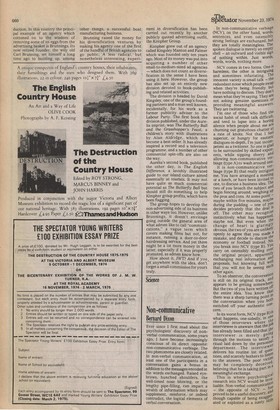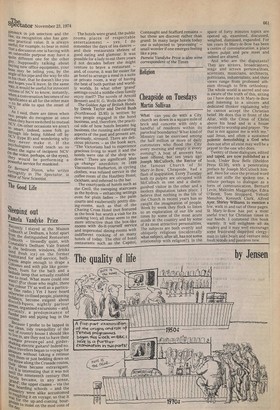Science
Non-communicative
Bernard Dixon
Ever since I first read about the psychologists' discovery of nonverbal communication, some years ago, I have become increasingly conscious of its direct opposite: non-communicative verbiage. The two phenomena are closely related. In non-verbal communication, at least one of the participants in a conversation gains a bonus in addition to the messages encoded in the words exchanged. Raised eyebrows, hunched shoulders, the well-timed nose blowing, or the lengthy pipe-filling, can impart a wealth of information which may supplement, reinforce, or indeed contradict, the logical elements of verbal conversation. In non-communicative verbiage (NCV), on the other hand, words, sentences, and even ostensibly strong feelings are exchanged, but they are totally meaningless. The spoken dialogue is merely an empty shell — an outward and visible sign of nothing within. Just words, words, words, nothing more.
NCV comes in two forms. One is harmless; the other is intriguing and sometimes infuriating. The innocent variety is small talk — the redundant noise which people swaP when they're being friendly but have nothing to discuss. They don't mean what they're saying. They are not asking genuine questions or providing meaningful answers They are twittering. I'm one of those who find the social habit of small talk difficult, and tend to lapse into a boring silence when people about me are churning out gratuitous chatter at a rate of knots. Not that I feel superior, or hungry for esoteric dialogues-in-depth, I'm just incour petent as a twitterer. So one is glad to be surrounded by skilled exponents, while sipping sherry and allowing non-communicative verbiage (type A) to wash around one. It is non-communicative ver" biage (type B) that really intrigues me. You have arranged a meeting or a lunch, or have been invited to one, to discuss a business idea. The, two of you broach the subject anu begin fencing around, weighing a the pros and cons. At some point — maybe within five minutes, maybe during the pudding — one of 3r° decides privately that the deal is off. The other may recogni_Ase instinctively what has happen,' Maybe not. But even when tu,' change of heart is glaringJ,Y obvious, the two of you are unlikelV openly to agree that you made a mistake, and decide to discuss the economy or football instead. ro' you break into NCV (type B). Y011 carry on ostensibly mulling over the original project, apparent exchanging real information an„ proposals, but knowing full vve'h' that you will not be seeing eac" other again. To an observer, the conversatio is still on its original track, an..r/ appears to be getting somewher;; But the two of you have written 01: the entire idea. You know tha,„' there was a sharp turning point the conversation when you bot' switched off your authentic concenl. In its worst form, NCV (type what happens, one-sidedly, in ore of those interviews wheretl'h interviewee is unaware that the jo" hasalready been eeins filled that interviewer through the motions to satisfY ritual laid down by the personne; department. The intervieWei delivers his routine list of clues; tions, and scarcely bothers to liste' to the answers. The poor v ictilr may be completely deceive!, believing that he is taking part in meaningful exchange. al This is where psychologi° research into NCV would be Ovaluabthlee. Non-verbal of balcoNmcnivunifatioll has proved to be a useful discoverY, though capable of being exagge,'; ated or exploited as a nasty Mt' pec+.a.or November 23, 1974
gliumick in job selection and the like, its recognition also has genuine practical value. It is always useful, for example, to bear in mind that a discussion one is having with an ostensible purpose may have a quite different one for the other
FilY. Supposedly talking about outin
.g new office equipment, your
boss may be telling you, by the angle of his pipe and the way he sits in his chair, that he doesn't like you arid hopes you'll leave. In the same waY, it would be useful for innocent victims of NCV to know, instantly, When a conversation becomes of no significance at all for the other man
— to be able to spot the onset of NCV,
As I said, there are times when two people do recognise at once When they have switched to mutual NCV. On other occasions we aren't sO smart. Indeed, some folk go through life being fobbed off by INCV (type B) and wondering why theY never make it. If the Psychologists could teach us to detect the signs of incipient NCV (in the voice, perhaps, or the eyes), they would be performing a Powerful service for mankind. Dr Bernard Dixon, who writes fortnightiy in The Spectator, is itor of New Scientist



































 Previous page
Previous page